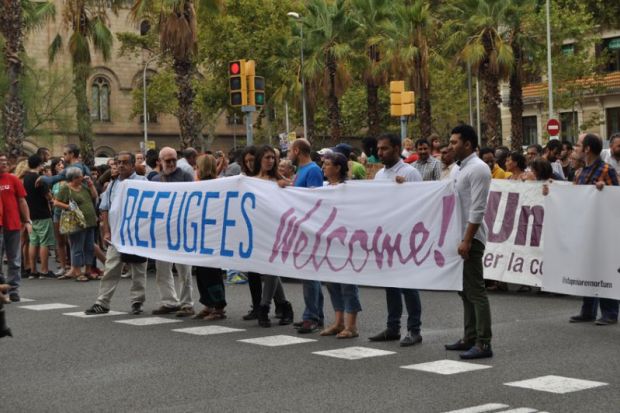A new global online platform that aims to connect refugee students with university scholarships, resources and other higher education opportunities has been launched.
The “clearing house” is the first initiative of the Catalyst Trust for Universal Education, a new philanthropic organisation that aims to “expand access to high-quality education for children and youth around the world”.
John Sexton, former president of New York University, launched the trust at the New York headquarters of the Institute of International Education, where he was joined by Allan Goodman, the IIE president, and former UK prime minister Gordon Brown, the United Nations special envoy on global education, for a discussion about the emergency needs of more than 57 million schoolchildren and university-age young people across the world caught up in war, persecution and the ongoing refugee crisis.
A recent report by the UN High Commission for Refugees indicates that only 1 per cent of refugees attend university, compared with a global average of 34 per cent.
In Syria alone, 150,000 people were about to take up places at universities when the civil war broke out, yet the scale of humanitarian crises there and elsewhere means that no more than 2 per cent of funds raised by relief organisations are devoted to education.
The Platform for Education in Emergencies Response (PEER) – a collaboration between the IIE and the Catalyst Trust – will help refugee students to identify scholarships and opportunities and provide access to resources such as online courses, translation services and advocacy groups.
Although PEER will initially focus its efforts on the current Syrian crisis (and therefore make material available in Arabic as well as English), the longer-term plan is to extend its coverage to displaced students all over the world.
The Catalyst Trust also intends to “advocate for the increased government and international support that is urgently required to address the global education crisis”.
“Many in the higher education community have indicated that they are willing to accept refugee students,” said Mr Sexton, a founding director of the trust. “We aim to provide them with the education they deserve.”
The IIE has nearly a century’s experience in providing emergency assistance to students and scholars facing threats and danger. Among its other responses to the Syrian crisis, it recently joined forces with Jusoor, an international organisation of expatriate Syrians, in a project called 100 Syrian Women, 10,000 Syrian Lives, which will give 100 Syrian women the chance to study at universities in the US and Canada over the next four academic years.
“As the crisis multiplies, there is a real prospect of a lost generation,” said Mr Goodman. “We must not let that happen.”
Register to continue
Why register?
- Registration is free and only takes a moment
- Once registered, you can read 3 articles a month
- Sign up for our newsletter
Subscribe
Or subscribe for unlimited access to:
- Unlimited access to news, views, insights & reviews
- Digital editions
- Digital access to THE’s university and college rankings analysis
Already registered or a current subscriber?








